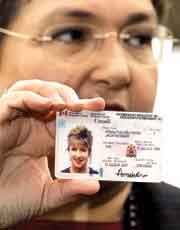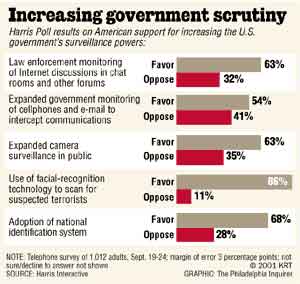 The Associated Press
The Associated Press Federal Immigration Minister Elinor Caplan shows off Canada's new Maple Leaf photo identity card, which new Canadian immigrants will be issued starting next June.
NATIONAL ID CARDS
Privacy vs. security
Tucson, Arizona Thursday, 18 October 2001
http://www.azstarnet.com/star/today/11018identity.card-pmb2fjmd.html
NATIONAL ID CARD: WHAT IT IS, WHAT IT WOULD DO
The Ellison proposal
U.S. citizens would voluntarily agree to obtain cards. Those without them would be subject to more rigorous searches at airports. The cards would be mandatory for foreign visitors, including students on visas and noncitizens living and working in the United States who now carry "green cards."
How the cards would work
Each card would contain basic information about the holder, including Social Security number. Each card would be linked to a federal database containing detailed personal data, including digital records of the person's thumbprint, palm print, face or eyes. At an airport, passengers would show their card and have their thumbs scanned by a digital reader to verify their identity.
The cards also would be instantly checked against the national database. That database would link existing criminal and immigration data to screen out potential terrorists.
How effective are they?
The embedded computer chips in so-called smart cards can hold far more data more securely than cards with a magnetic strip, such as bank cards. Proponents say that makes them the best available technology for a tamperproof ID.
Smart-card technology is already in use at businesses and on college campuses for identification and building access as well as payments in cafeterias and parking lots.
However, experts say that the cards are not hack-proof.
"Without the right cautions, a security device actually empowers you to commit fraud," said James Van Dyke, who studies payment practices for Jupiter Media Metrix.
 The Associated Press
The Associated Press
Federal Immigration Minister Elinor Caplan shows off Canada's new Maple Leaf photo identity card, which new Canadian immigrants will be issued starting next June.
Software mogul Ellison meets with top Bush officials to discuss proposal
By Elise Ackerman and Paul Rogers
KNIGHT RIDDER NEWSPAPERS
SAN JOSE, Calif.
Silicon Valley software mogul Larry Ellison's proposal to create a national ID card has gained substantial ground - and the interest of top Bush administration officials - in a signal that the controversial idea may be closer to reality than ever.
Ellison, the chairman and CEO of Oracle, said he met with Attorney General John Ashcroft and officials at the CIA and the FBI in Washington, D.C., over the past week to discuss the idea.
Oracle is the No. 1 maker of software databases. Ellison, one of the world's richest men, has offered to donate the software technology to create the cards.
Sen. Dianne Feinstein, D-Calif., chairwoman of the Senate Judiciary subcommittee on terrorism, supports the idea.
She said she will write a letter this week to Ashcroft asking the administration to move forward.
"There has to be some ID," Feinstein said. "We have had a major catastrophe. This is a very serious time. The country is at war. The purpose here is to protect ourselves."
The idea of a national ID card has been debated since the 1930s, but the Sept. 11 terrorist attacks have reignited the discussion over privacy and security.
"We are in the process of putting a proposal together and analyzing what it would take to get something running in a matter of a small number of months, like three months, 90 days," Ellison said. "We think we could put up this technology very, very quickly."
He unveiled the idea three weeks ago in an interview with a California TV station.
Any move by the federal government to institute a national ID card system could mean millions for Silicon Valley companies.
Shalini Chowdhary, an analyst at Frost & Sullivan, said the U.S. government could end up spending more than $3 billion on computer chips, hardware, software and services that go into creating so-called "smart" ID cards.
Ellison said that if he does donate the software, maintenance and upgrades won't be free. Airports and other places would need card readers, which cost $100 to $500 each.
"I don't think the government has any trouble paying for the labor associated with the software," Ellison said.
He bristled at the notion that he was hoping to profit from the nation's troubles.
"I made this offer not because the government can't afford to pay for the software, but because I shut up the critics who were saying, 'Gee, Larry Ellison wants to build a national database because he wants to sell more databases,' which is pretty cynical and bizarre," he said. "What's in it for me is the same thing that's in it for you: a safer America."

* Associated Press technology writer Jim Krane contributed to this report.
All content copyright © 1999, 2000, 2001 AzStarNet, Arizona Daily Star and its wire services and suppliers and may not be republished without permission. All rights reserved. Any copying, redistribution, or retransmission of any of the contents of this service without the expressed written consent of Arizona Daily Star or AzStarNet is prohibited.